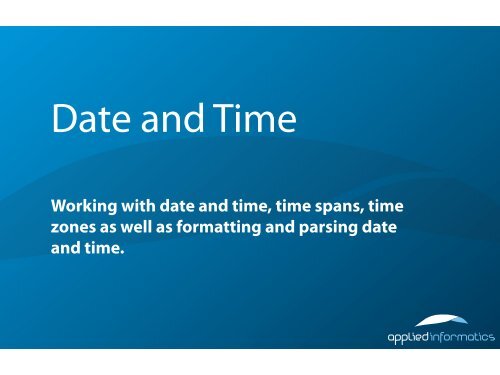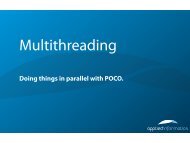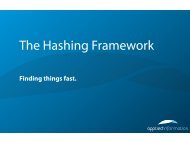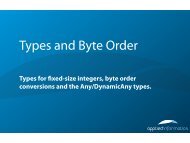Working with date and time, time spans, time zones as well ... - Poco
Working with date and time, time spans, time zones as well ... - Poco
Working with date and time, time spans, time zones as well ... - Poco
Create successful ePaper yourself
Turn your PDF publications into a flip-book with our unique Google optimized e-Paper software.
Date <strong>and</strong> Time<br />
<strong>Working</strong> <strong>with</strong> <strong>date</strong> <strong>and</strong> <strong>time</strong>, <strong>time</strong> <strong>spans</strong>, <strong>time</strong><br />
<strong>zones</strong> <strong>as</strong> <strong>well</strong> <strong>as</strong> formatting <strong>and</strong> parsing <strong>date</strong><br />
<strong>and</strong> <strong>time</strong>.
Overview<br />
> Timestamp<br />
> DateTime <strong>and</strong> LocalDateTime<br />
> Timespan<br />
> Timezone<br />
> Formatting <strong>and</strong> parsing <strong>date</strong>s <strong>and</strong> <strong>time</strong>s
The Timestamp Cl<strong>as</strong>s<br />
> <strong>Poco</strong>::Timestamp is the main <strong>time</strong> keeping cl<strong>as</strong>s in <strong>Poco</strong>.<br />
> #include "<strong>Poco</strong>/Timestamp.h"<br />
> It stores a UTC-b<strong>as</strong>ed monotonic 64-bit <strong>time</strong> value <strong>with</strong> (up to)<br />
microsecond resolution. The actual resolution depends on the<br />
operating system.<br />
> Since <strong>Poco</strong>::Timestamp is UTC-b<strong>as</strong>ed, it is independent of the<br />
<strong>time</strong>zone (<strong>and</strong> changes to it).<br />
> <strong>Poco</strong>::Timestamp supports value semantics, comparison <strong>and</strong><br />
simple arithmetics.
The Timestamp Cl<strong>as</strong>s (cont'd)<br />
> <strong>Poco</strong>::Timestamp defines a few public types:<br />
> TimeVal<br />
a 64-bit signed integer holding UTC <strong>time</strong> <strong>with</strong> microsecond<br />
resolution<br />
> UtcTimeVal<br />
a 64-bit signed integer holding UTC <strong>time</strong> <strong>with</strong> 100<br />
nanoseconds resolution (actual resolution is still TimeDiff<br />
a 64-bit signed integer holding the difference between two<br />
Timestamp's in microseconds
Epoch Time <strong>and</strong> UTC Time<br />
> In Unix, epoch <strong>time</strong> is the <strong>time</strong> me<strong>as</strong>ured in seconds since<br />
midnight, January 1, 1970.<br />
> UTC (Coordinated Universal Time) is the <strong>time</strong> me<strong>as</strong>ured in 100<br />
nanosecond intervals since midnight, October 15, 1582.
Constructing a Timestamp<br />
> The default constructor initializes a Timestamp <strong>with</strong> the current<br />
<strong>time</strong>.<br />
> Two static functions can be used to create a Timestamp from a<br />
<strong>time</strong>_t, or from a UTC <strong>time</strong>:<br />
> Timestamp fromEpochTime(<strong>time</strong>_t <strong>time</strong>)<br />
> Timestamp fromUtcTime(UtcTimeVal val)
Timestamp Functions<br />
> <strong>time</strong>_t epochTime() const<br />
returns the <strong>time</strong> expressed in <strong>time</strong>_t (epoch <strong>time</strong>)<br />
> UtcTimeVal utcTime() const<br />
returns the <strong>time</strong> expressed in UTC <strong>with</strong> 100 nanoseconds<br />
resolution<br />
> TimeVal epochMicroseconds() const<br />
returns the <strong>time</strong> expressed in microseconds since the Unix epoch
Timestamp Functions (cont'd)<br />
> void up<strong>date</strong>()<br />
up<strong>date</strong>s the Timestamp <strong>with</strong> the current <strong>time</strong><br />
> TimeDiff elapsed() const<br />
returns the microseconds elapsed since the <strong>time</strong> stored in the<br />
Timestamp<br />
> bool isElapsed(TimeDiff interval) const<br />
returns true if at le<strong>as</strong>t interval microseconds have p<strong>as</strong>sed since<br />
the <strong>time</strong> stored in the Timestamp
Timestamp Arithmetics<br />
> Timestamp operator + (TimeDiff diff) const<br />
adds a <strong>time</strong> span to the Timestamp <strong>and</strong> returns the result<br />
> Timestamp operator - (TimeDiff diff) const<br />
subtracts a <strong>time</strong> span from the Timestamp <strong>and</strong> returns the result<br />
> TimeDiff operator - (const Timestamp& ts) const<br />
returns the <strong>time</strong> difference between two Timestamp's<br />
> Timestamp& operator += (TimeDiff d)<br />
Timestamp& operator -= (TimeDiff d)<br />
adds/subtracts a <strong>time</strong> span to/from the Timestamp
#include "<strong>Poco</strong>/Timestamp.h"<br />
#include <br />
using <strong>Poco</strong>::Timestamp;<br />
int main(int argc, char** argv)<br />
{<br />
Timestamp now; // the current <strong>date</strong> <strong>and</strong> <strong>time</strong><br />
std::<strong>time</strong>_t t1 = now.epochTime(); // convert to <strong>time</strong>_t ...<br />
Timestamp ts1(Timestamp::fromEpochTime(t1)); // ... <strong>and</strong> back again<br />
for (int i = 0; i < 100000; ++i) ;<br />
Timestamp::TimeDiff diff = now.elapsed();<br />
Timestamp start(now);<br />
now.up<strong>date</strong>();<br />
<strong>time</strong><br />
diff = now - start;<br />
// wait a bit<br />
// how long did it take?<br />
// save start <strong>time</strong><br />
// up<strong>date</strong> <strong>with</strong> current<br />
// again, how long?<br />
}<br />
return 0;
The DateTime Cl<strong>as</strong>s<br />
> <strong>Poco</strong>::DateTime is used for working <strong>with</strong> calendar <strong>date</strong>s <strong>and</strong><br />
<strong>time</strong>s, b<strong>as</strong>ed on the Gregorian calendar.<br />
> #include "<strong>Poco</strong>/DateTime.h"<br />
> It should be used for <strong>date</strong> calculations only. For storing <strong>date</strong>s <strong>and</strong><br />
<strong>time</strong>s, the Timestamp cl<strong>as</strong>s is more appropriate.<br />
> Internally, DateTime maintains the <strong>date</strong> <strong>and</strong> <strong>time</strong> in two formats:<br />
UTC <strong>and</strong> broken down (into year, month, day, hour, minute,<br />
second, millisecond, microsecond).<br />
> For internal conversions, DateTime also uses the Julian Day.
The Gregorian Calendar<br />
> The Gregorian calendar, a modification of the Julian calendar, is<br />
used nearly everywhere in the world. Its years are numbered<br />
b<strong>as</strong>ed on the traditional birth year of Jesus Christ, which is<br />
labeled the "anno Domini" era.<br />
> It counts days <strong>as</strong> the b<strong>as</strong>ic unit of <strong>time</strong>, grouping them into years<br />
of 365 or 366 days. A year is divided into 12 months of irregular<br />
length.<br />
> Not all countries adopted the Gregorian calendar at the same<br />
<strong>time</strong> (e.g., Germany in 1582, Engl<strong>and</strong> in 1752).<br />
> Therefore, Gregorian <strong>date</strong>s <strong>and</strong> historic (old-style) <strong>date</strong>s might<br />
differ, although referring to the same event in <strong>time</strong>.
Julian Day <strong>and</strong> Julian Date<br />
> The Julian day or Julian day number (JDN) is the number of days<br />
that have elapsed since Monday, January 1, 4713 BC in the<br />
proleptic Julian calendar. That day is counted <strong>as</strong> Julian day zero.<br />
Thus the multiples of 7 are Mondays. Negative values can also be<br />
used.<br />
> The Julian Date (JD) is the number of days (<strong>with</strong> decimal fraction<br />
of the day) that have elapsed since 12 noon Greenwich Mean<br />
Time (UT or TT) of that day.
DateTime Considerations<br />
> Zero is a valid year (in accordance <strong>with</strong> ISO 8601 <strong>and</strong><br />
<strong>as</strong>tronomical year numbering).<br />
> Year zero is a leap year.<br />
> Negative years (years preceding 1 BC) are not supported.<br />
> Gregorian <strong>date</strong>s might differ from historical <strong>date</strong>s, depending on<br />
which calendar w<strong>as</strong> in use at the <strong>time</strong>.<br />
> It is best to use DateTime for "current" <strong>date</strong>s only. For historical or<br />
<strong>as</strong>tronomical calendar calculations, specialized software (that<br />
takes into account local Gregorian calendar adoption, etc.)<br />
should be used.
Constructing a DateTime<br />
> A DateTime can be constructed from:<br />
> the current <strong>date</strong> <strong>and</strong> <strong>time</strong><br />
> a Timestamp<br />
> a broken-down <strong>date</strong> <strong>and</strong> <strong>time</strong> (year, month, day, hour, minute,<br />
second, millisecond, microsecond)<br />
> a Julian day (stored in a double)
DateTime Functions<br />
> int year() const<br />
returns the year<br />
> int month() const<br />
returns the month (1 - 12)<br />
> int week(int firstDayOfWeek = DateTime::MONDAY) const<br />
returns the week number <strong>with</strong>in the year, according to ISO 8601<br />
(week 1 is the week containing January 4); firstDayOfWeek<br />
should be DateTime::MONDAY or DateTime::SUNDAY.<br />
> int day() const<br />
returns the day <strong>with</strong>in the month (1 - 31)
DateTime Functions (cont'd)<br />
> int dayOfWeek() const<br />
returns the day <strong>with</strong>in the week<br />
(0 = DateTime::SUNDAY, 1 = DateTime::MONDAY, ...,<br />
6 = DateTime::SATURDAY)<br />
> int dayOfYear() const<br />
returns the number of the day in the year (1 - 366)
DateTime Functions (cont'd)<br />
> int hour() const<br />
returns the hour (0 - 23)<br />
> int hourAMPM() const<br />
returns the hour (0 - 12)<br />
> bool isAM() const<br />
returns true if hour() < 12, false otherwise<br />
> bool isPM() const<br />
returns true if hour() >= 12, false otherwise
DateTime Functions (cont'd)<br />
> int minute() const<br />
returns the minute (0 - 59)<br />
> int second() const<br />
returns the second (0 - 59)<br />
> int millisecond() const<br />
returns the millisecond (0 - 999)<br />
> int microsecond() const<br />
returns the microsecond (0 - 999)
DateTime Functions (cont'd)<br />
> Timestamp <strong>time</strong>stamp() const<br />
returns the <strong>date</strong> <strong>and</strong> <strong>time</strong> expressed <strong>as</strong> a Timestamp<br />
> Timestamp::UtcTimeVal utcTime() const<br />
returns the <strong>date</strong> <strong>and</strong> <strong>time</strong> expressed in UTC-b<strong>as</strong>ed <strong>time</strong><br />
> DateTime supports all relational operators<br />
(==, !=, >, >=,
DateTime Static Functions<br />
> bool isLeapYear(int year)<br />
returns true if the given year is a leap year, false otherwise<br />
> int daysOfMonth(int year, int month)<br />
returns the number of days in the given month, for the given year<br />
> bool isValid(int year, int month, int day,<br />
int hour, int minute, int second, int millisecond, int microsecond)<br />
returns true if the given <strong>date</strong> <strong>and</strong> <strong>time</strong> is valid (all arguments are<br />
<strong>with</strong>in their proper ranges), false otherwise (takes into account<br />
leap years)
DateTime Month <strong>and</strong> Weekday Names<br />
> <strong>Poco</strong>::DateTime h<strong>as</strong> enumerations for month <strong>and</strong> weekday<br />
names. These can be used in place of numeric values:<br />
> DateTime::Months<br />
(JANUARY, FEBRUARY, MARCH, APRIL, MAY, JUNE, JULY,<br />
AUGUST, SEPTEMBER, OCTOBER, NOVEMBER, DECEMBER)<br />
> DateTime::DaysOfWeek<br />
(SUNDAY, MONDAY, TUESDAY, WEDNESDAY, THURSDAY,<br />
FRIDAY, SATURDAY)
#include "<strong>Poco</strong>/DateTime.h"<br />
using <strong>Poco</strong>::DateTime;<br />
int main(int argc, char** argv)<br />
{<br />
DateTime now; // the current <strong>date</strong> <strong>and</strong> <strong>time</strong> in UTC<br />
int year = now.year();<br />
int month = now.month();<br />
int day = now.day();<br />
int dow = now.dayOfWeek();<br />
int doy = now.dayOfYear();<br />
int hour = now.hour();<br />
int hour12 = now.hourAMPM();<br />
int min = now.minute();<br />
int sec = now.second();<br />
int ms = now.millisecond();<br />
int us = now.microsecond();<br />
double jd = now.julianDay();<br />
<strong>Poco</strong>::Timestamp ts = now.<strong>time</strong>stamp();<br />
DateTime xm<strong>as</strong>(2006, 12, 25); // 2006-12-25 00:00:00<br />
<strong>Poco</strong>::Timespan <strong>time</strong>ToXm<strong>as</strong> = xm<strong>as</strong> - now;
DateTime dt(1973, 9, 12, 2, 30, 45); // 1973-09-12 02:30:45<br />
dt.<strong>as</strong>sign(2006, 10, 13, 13, 45, 12, 345); // 2006-10-13 12:45:12.345<br />
bool isAM = dt.isAM(); // false<br />
bool isPM = dt.isPM(); // true<br />
bool isLeap = DateTime::isLeapYear(2006); // false<br />
int days = DateTime::daysOfMonth(2006, 2); // 28<br />
bool isValid = DateTime::isValid(2006, 02, 29); // false<br />
dt.<strong>as</strong>sign(2006, DateTime::OCTOBER, 22); // 2006-10-22 00:00:00<br />
if (dt.dayOfWeek() == DateTime::SUNDAY)<br />
{<br />
// ...<br />
}<br />
}<br />
return 0;
The LocalDateTime Cl<strong>as</strong>s<br />
> <strong>Poco</strong>::LocalDateTime is similar to <strong>Poco</strong>::DateTime, except that it<br />
stores a local <strong>time</strong>, <strong>as</strong> opposed to UTC, <strong>as</strong> <strong>well</strong> <strong>as</strong> a <strong>time</strong> zone<br />
differential.<br />
> #include "<strong>Poco</strong>/LocalDateTime.h"<br />
> The <strong>time</strong> zone differential denotes the difference in seconds<br />
between UTC <strong>and</strong> local <strong>time</strong><br />
(UTC = local <strong>time</strong> - <strong>time</strong> zone differential).
Constructing a LocalDateTime<br />
> A LocalDateTime can be constructed from:<br />
> the current <strong>date</strong> <strong>and</strong> <strong>time</strong><br />
> a Timestamp<br />
> a broken-down <strong>date</strong> <strong>and</strong> <strong>time</strong> (year, month, day, hour, minute,<br />
second, millisecond, microsecond)<br />
> a Julian day (stored in a double)<br />
> Optionally, a <strong>time</strong> zone differential can be specified <strong>as</strong> first<br />
argument (if none is specified, the system's current <strong>time</strong> zone is<br />
used).
LocalDateTime Functions<br />
> LocalDateTime supports all functions that DateTime supports.<br />
> All relational operators normalize to UTC before carrying out the<br />
comparison.<br />
> int tzd() const<br />
returns the <strong>time</strong> zone differential (seconds)<br />
> DateTime utc() const<br />
converts the local <strong>time</strong> to UTC
#include "<strong>Poco</strong>/LocalDateTime.h"<br />
using <strong>Poco</strong>::LocalDateTime;<br />
int main(int argc, char** argv)<br />
{<br />
LocalDateTime now; // the current <strong>date</strong> <strong>and</strong> local <strong>time</strong><br />
int year = now.year();<br />
int month = now.month();<br />
int day = now.day();<br />
int dow = now.dayOfWeek();<br />
int doy = now.dayOfYear();<br />
int hour = now.hour();<br />
int hour12 = now.hourAMPM();<br />
int min = now.minute();<br />
int sec = now.second();<br />
int ms = now.millisecond();<br />
int us = now.microsecond();<br />
int tzd = now.tzd();<br />
double jd = now.julianDay();<br />
<strong>Poco</strong>::Timestamp ts = now.<strong>time</strong>stamp();
LocalDateTime dt1(1973, 9, 12, 2, 30, 45); // 1973-09-12 02:30:45<br />
dt1.<strong>as</strong>sign(2006, 10, 13, 13, 45, 12, 345); // 2006-10-13 12:45:12.345<br />
LocalDateTime dt2(3600, 1973, 9, 12, 2, 30, 45, 0, 0); // UTC +1 hour<br />
dt2.<strong>as</strong>sign(3600, 2006, 10, 13, 13, 45, 12, 345, 0);<br />
<strong>Poco</strong>::Timestamp nowTS;<br />
LocalDateTime dt3(3600, nowTS); // construct from Timestamp<br />
}<br />
return 0;
The Timespan Cl<strong>as</strong>s<br />
> <strong>Poco</strong>::Timespan represents a <strong>time</strong> span up to microsecond<br />
resolution.<br />
> #include "<strong>Poco</strong>/Timespan.h"<br />
> Internally, <strong>Poco</strong>::Timespan uses a 64-bit integer to store the <strong>time</strong><br />
span.<br />
> The <strong>time</strong> span can be expressed in days, hours, minutes, seconds,<br />
milliseconds <strong>and</strong> microseconds.
Timespan Scaling Factors<br />
> <strong>Poco</strong>::Timespan defines the following scaling factors:<br />
> MILLISECONDS<br />
the number of microseconds in a millisecond<br />
> SECONDS<br />
the number of microseconds in a second<br />
> MINUTES<br />
the number of microseconds in a minute<br />
> HOURS<br />
the number of microseconds in a hour<br />
> DAYS<br />
the number of microseconds in a day
Constructing a Timespan<br />
> A Timespan can be constructed from:<br />
> a TimeStamp::TimeDiff (microseconds)<br />
> seconds + microseconds<br />
useful for constructing a Timespan from a struct <strong>time</strong>val<br />
> broken down days, hours, minutes, seconds, microseconds
Timespan Operators<br />
> <strong>Poco</strong>::Timespan supports all relational operators<br />
(==, !=, =)<br />
> <strong>Poco</strong>::Timespan supports addition <strong>and</strong> subtraction<br />
(+, -, +=, -=)
Timespan Functions<br />
> int days() const<br />
returns the number of days<br />
> int hours() const<br />
return the number of hours <strong>with</strong>in the day (0 - 23)<br />
> int totalHours() const<br />
returns the total number of hours<br />
> int minutes() const<br />
return the number of minutes <strong>with</strong>in the hour (0 - 59)<br />
> int totalMinutes() const<br />
return the total number of minutes
Timespan Functions (cont'd)<br />
> int seconds() const<br />
returns the number of seconds <strong>with</strong>in the minute (0 - 60)<br />
> int totalSeconds() const<br />
returns the total number of seconds<br />
> int milliseconds() const<br />
returns the number of milliseconds <strong>with</strong>in the second (0 - 999)<br />
> int totalMilliseconds() const<br />
returns the total number of milliseconds
Timespan Functions (cont'd)<br />
> int microseconds() const<br />
returns the number of microseconds <strong>with</strong>in the millisecond (0 -<br />
999)<br />
> int totalMicroseconds() const<br />
returns the total number of microseconds
#include "<strong>Poco</strong>/Timespan.h"<br />
using <strong>Poco</strong>::Timespan;<br />
int main(int argc, char** argv)<br />
{<br />
Timespan ts1(1, 11, 45, 22, 123433); // 1d 11h 45m 22.123433s<br />
Timespan ts2(33*Timespan::SECONDS); // 33s<br />
Timespan ts3(2*Timespan::DAYS + 33*Timespan::HOURS); // 3d 33h<br />
int days = ts1.days(); // 1<br />
int hours = ts1.hours(); // 11<br />
int totalHours = ts1.totalHours(); // 35<br />
int minutes = ts1.minutes(); // 45<br />
int totalMins = ts1.totalMinutes(); // 2145<br />
int seconds = ts1.seconds(); // 22<br />
int totalSecs = ts1.totalSeconds(); // 128722<br />
}<br />
return 0;
DateTime <strong>and</strong> Timespan Calculations<br />
> DateTime, LocalDateTime <strong>and</strong> Timespan can be used together for<br />
<strong>date</strong> <strong>and</strong> <strong>time</strong> arithmetics, e.g.:<br />
> add a number of days to a <strong>date</strong><br />
> add a number of hours to a <strong>date</strong><br />
> calculate the difference between two <strong>date</strong>s in days (or hours,<br />
or seconds, ...)
#include "<strong>Poco</strong>/DateTime.h"<br />
#include "<strong>Poco</strong>/Timespan.h"<br />
using <strong>Poco</strong>::DateTime;<br />
using <strong>Poco</strong>::Timespan;<br />
int main(int argc, char** argv)<br />
{<br />
// what is my age?<br />
DateTime birth<strong>date</strong>(1973, 9, 12, 2, 30); // 1973-09-12 02:30:00<br />
DateTime now;<br />
Timespan age = now - birth<strong>date</strong>;<br />
int days = age.days();<br />
// in days<br />
int hours = age.totalHours(); // in hours<br />
int secs = age.totalSeconds(); // in seconds<br />
// when w<strong>as</strong> I 10000 days old?<br />
Timespan span(10000*Timespan::DAYS);<br />
DateTime dt = birth<strong>date</strong> + span;<br />
}<br />
return 0;
The Timezone Cl<strong>as</strong>s<br />
> <strong>Poco</strong>::Timezone provides static methods for getting information<br />
about the system's <strong>time</strong> zone, such <strong>as</strong>:<br />
> the <strong>time</strong> zone differential<br />
> whether daylight saving <strong>time</strong> (DST) is in effect<br />
> the name of the <strong>time</strong> zone<br />
> #include "<strong>Poco</strong>/Timezone.h"
Timezone Functions<br />
> int utcOffset()<br />
returns the offset of local <strong>time</strong> to UTC, in seconds, <strong>and</strong> not<br />
including DST (local <strong>time</strong> = UTC + utcOffset())<br />
> int dst()<br />
returns the daylight saving <strong>time</strong> offset in seconds (usually 3600) if<br />
DST is in effect, or 0 otherwise.<br />
> bool isDst(const Timestamp& <strong>time</strong>stamp)<br />
returns true if DST is in effect for the given <strong>time</strong><br />
> int tzd()<br />
returns the <strong>time</strong> zone differential for the current <strong>time</strong> zone (tzd =<br />
utcOffset() + dst())
Timezone Functions (cont'd)<br />
> std::string name()<br />
returns the <strong>time</strong> zone's name currently in effect<br />
> std::string st<strong>and</strong>ardName()<br />
returns the <strong>time</strong> zone's name if DST is not in effect<br />
> std::string dstName()<br />
returns the <strong>time</strong> zone's name if DST is in effect<br />
> The names reported are dependent on the operating system <strong>and</strong><br />
are not portable across systems.<br />
They should be used for display purposes only.
#include "<strong>Poco</strong>/Timezone.h"<br />
#include "<strong>Poco</strong>/Timestamp.h"<br />
using <strong>Poco</strong>::Timezone;<br />
using <strong>Poco</strong>::Timestamp;<br />
int main(int argc, char** argv)<br />
{<br />
int utcOffset = Timezone::utcOffset();<br />
int dst = Timezone::dst();<br />
bool isDst = Timezone::isDst(Timestamp());<br />
int tzd = Timezone::tzd();<br />
std::string name = Timezone::name();<br />
std::string stdName = Timezone::st<strong>and</strong>ardName();<br />
std::string dstName = Timezone::dstName();<br />
}<br />
return 0;
Formatting Date <strong>and</strong> Time<br />
> <strong>Poco</strong>::DateTimeFormatter can be used to format <strong>date</strong>s <strong>and</strong> <strong>time</strong>s<br />
(Timestamp, DateTime, LocalDateTime <strong>and</strong> Timespan) <strong>as</strong> strings.<br />
> #include "<strong>Poco</strong>/DateTimeFormat.h"<br />
> <strong>Poco</strong>::DateTimeFormatter uses a format string similar to<br />
strf<strong>time</strong>(). For details, ple<strong>as</strong>e see the reference documentation.<br />
> Pre-defined format strings for commonly used formats can be<br />
found in cl<strong>as</strong>s <strong>Poco</strong>::DateTimeFormat.
DateTimeFormatter Functions<br />
> All functions of DateTimeFormatter are static.<br />
> std::string format(const Timestamp& <strong>time</strong>stamp,<br />
const std::string& fmt, int tzd = UTC)<br />
formats the given Timestamp according to the given format<br />
string fmt. The <strong>time</strong> zone differential (tzd) is optional.<br />
> std::string format(const DateTime& <strong>date</strong>Time,<br />
const std::string& fmt, int tzd = UTC)<br />
is similar to the previous function, except that this one accepts a<br />
DateTime
DateTimeFormatter Functions (cont'd)<br />
> std::string format(const LocalDateTime& <strong>date</strong>Time,<br />
const std::string& fmt)<br />
accepts a LocalDateTime (which includes a <strong>time</strong> zone differential)<br />
<strong>and</strong> formats it according to the format string fmt<br />
> std::string format(const Timespan& <strong>time</strong>span,<br />
const std::string& fmt)<br />
formats the given <strong>time</strong>span according to the format string fmt
DateTimeFormatter Functions (cont'd)<br />
> All format() functions have append() counterparts that should be<br />
used to improve performance when appending a formatted<br />
<strong>date</strong>/<strong>time</strong> to a string.<br />
> All format() functions are implemented using append().
Pre-defined Format Strings<br />
> <strong>Poco</strong>::DateTimeFormat defines a set of commonly used <strong>date</strong> <strong>and</strong><br />
<strong>time</strong> formats.<br />
> #include "<strong>Poco</strong>/DateTimeFormat.h"<br />
> Examples:<br />
> ISO8601_FORMAT (2005-01-01T12:00:00+01:00)<br />
> RFC1123_FORMAT (Sat, 1 Jan 2005 12:00:00 +0100)<br />
> SORTABLE_FORMAT (2005-01-01 12:00:00)<br />
> For more information, ple<strong>as</strong>e see the reference documentation.
#include "<strong>Poco</strong>/DateTime.h"<br />
#include "<strong>Poco</strong>/Timestamp.h"<br />
#include "<strong>Poco</strong>/Timespan.h"<br />
#include "<strong>Poco</strong>/DateTimeFormatter.h"<br />
#include "<strong>Poco</strong>/DateTimeFormat.h"<br />
using <strong>Poco</strong>::DateTimeFormatter;<br />
using <strong>Poco</strong>::DateTimeFormat;<br />
int main(int argc, char** argv)<br />
{<br />
<strong>Poco</strong>::DateTime dt(2006, 10, 22, 15, 22, 34);<br />
std::string s(DateTimeFormatter::format(dt, "%e %b %Y %H:%M"));<br />
// "22 Oct 2006 15:22"<br />
<strong>Poco</strong>::Timestamp now;<br />
s = DateTimeFormatter::format(now, DateTimeFormat::SORTABLE_FORMAT);<br />
// "2006-10-30 09:27:44"<br />
<strong>Poco</strong>::Timespan span(5, 11, 33, 0, 0);<br />
s = DateTimeFormatter::format(span, "%d days, %H hours, %M minutes");<br />
// "5 days, 11 hours, 33 minutes"<br />
}<br />
return 0;
Parsing Date <strong>and</strong> Time<br />
> <strong>Poco</strong>::DateTimeParser can be used to parse <strong>date</strong>s <strong>and</strong> <strong>time</strong>s from<br />
strings.<br />
> #include "<strong>Poco</strong>/DateTimeParser.h"<br />
> <strong>Poco</strong>::DateTimeParser always returns a DateTime <strong>and</strong> a <strong>time</strong> zone<br />
differential. The DateTime can then be converted to a Timestamp<br />
or a LocalDateTime.<br />
> All functions of <strong>Poco</strong>::DateTimeParser are static.<br />
> <strong>Poco</strong>::DateTimeParser uses the same format strings <strong>as</strong><br />
<strong>Poco</strong>::DateTimeFormatter.
DateTimeParser Functions<br />
> void parse(const std::string fmt, const std::string& str,<br />
DateTime& <strong>date</strong>Time, int& tzd)<br />
parses a <strong>date</strong> <strong>and</strong> <strong>time</strong> in the format given in fmt from the string<br />
str. Stores the <strong>date</strong> <strong>and</strong> the <strong>time</strong> in <strong>date</strong>Time <strong>and</strong> the <strong>time</strong> zone<br />
differential in tzd. Throws a <strong>Poco</strong>::SyntaxException if the string<br />
cannot be parsed.<br />
> DateTime parse(const std::string& fmt,<br />
const std::string& str, int& tzd)<br />
similar to the above, but returns the DateTime
DateTimeParser Functions (cont'd)<br />
> bool tryParse(const std::string& fmt, const std::string& str,<br />
DateTime& <strong>date</strong>Time, int& tzd)<br />
tries to parse a <strong>date</strong> <strong>and</strong> <strong>time</strong> in the format given in fmt from the<br />
string str. If successful, stores the <strong>date</strong> <strong>and</strong> the <strong>time</strong> in <strong>date</strong>Time<br />
<strong>and</strong> the <strong>time</strong> zone differential in tzd. Returns true if successful,<br />
otherwise false.
DateTimeParser Functions (cont'd)<br />
> void parse(const std::string& str, DateTime& <strong>date</strong>Time, int& tzd)<br />
parses a <strong>date</strong> <strong>and</strong> a <strong>time</strong> from the given string, recognizing all<br />
st<strong>and</strong>ard <strong>date</strong>/<strong>time</strong> formats defined by <strong>Poco</strong>::DateTimeFormat.<br />
Throws a <strong>Poco</strong>::SyntaxException if the format cannot be<br />
recognized, or the string does not match the expected format.<br />
> DateTime parse(const std::string& str, int& tzd)<br />
> bool tryParse(const std::string& str, DateTime& <strong>date</strong>Time, int&<br />
tzd)
#include "<strong>Poco</strong>/DateTimeParser.h"<br />
#include "<strong>Poco</strong>/DateTime.h"<br />
#include "<strong>Poco</strong>/DateTimeFormat.h"<br />
#include "<strong>Poco</strong>/LocalDateTime.h"<br />
#include "<strong>Poco</strong>/Timestamp.h"<br />
using <strong>Poco</strong>::DateTimeParser;<br />
using <strong>Poco</strong>::DateTimeFormat;<br />
using <strong>Poco</strong>::DateTime;<br />
int main(int argc, char** argv)<br />
{<br />
std::string s("Sat, 1 Jan 2005 12:00:00 GMT");<br />
int tzd;<br />
DateTime dt;<br />
DateTimeParser::parse(DateTimeFormat::RFC1123_FORMAT, s, dt, tzd);<br />
<strong>Poco</strong>::Timestamp ts = dt.<strong>time</strong>stamp();<br />
<strong>Poco</strong>::LocalDateTime ldt(tzd, dt);<br />
bool ok = DateTimeParser::tryParse("2006-10-22", dt, tzd);<br />
ok = DateTimeParser::tryParse("%e.%n.%Y", "22.10.2006", dt, tzd);<br />
}<br />
return 0;
To dig deeper...<br />
> The Gregorian Calendar<br />
http://en.wikipedia.org/wiki/Gregorian_calendar<br />
> The Julian Calendar<br />
http://en.wikipedia.org/wiki/Julian_calendar<br />
> The Julian Day<br />
http://en.wikipedia.org/wiki/Julian_day<br />
> Coordinated Universal Time (UTC)<br />
http://en.wikipedia.org/wiki/UTC<br />
> ISO 8601<br />
http://en.wikipedia.org/wiki/ISO_8601
Copyright © 2006-2010 by Applied Informatics Software Engineering GmbH.<br />
Some rights reserved.<br />
www.appinf.com | info@appinf.com<br />
T +43 4253 32596 | F +43 4253 32096
















